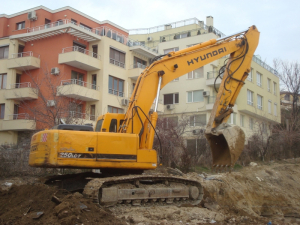Damage to natural gas pipelines is both dangerous and expensive to repair. Much of it is also entirely avoidable.
Excavators cause about 30 percent of pipeline damage incidents. In most of these events, the team working the excavator hadn’t bothered to find out if a natural gas pipeline is nearby before digging, even though there’s a national hotline set up to provide this information 24 hours a day, seven days a week.
In response, two researchers with the University of Houston Cullen College of Engineering are developing a low-cost GPS-based system that can provide real-time alerts to the pipeline owner and the person operating the excavator when digging is taking place near a pipeline. The research is supported by a $700,000 grant from the U.S Department of Transportation and the Gas Technology Institute.
Assistant Professor Craig Glennie and Professor Hanadi Rifai, both with the civil and environmental engineering department, are leading this project.
The system starts with two GPS units, one in the cab of the excavator and one at the end of the digging arm. The units will not only reveal where exactly the excavator is, but by comparing the readings from each one, the researchers will be able to tell whether the arm is actually below ground level, indicating that it is digging.
That information will be sent over a cellular network to a central server loaded with a geographic information system, or GIS, that will provide an accurate map of pipeline locations and their buffer zones. The GPS data and the GIS are then matched up to look for potential problems.
“The software will look at the signals coming from the excavator in real time, determine if it’s within any pipeline boundaries and actively digging, and if it is, will alert the owner of the pipeline and the person operating the excavator,” said Glennie.
While there are other systems that warn if an operator is digging near a pipeline, they cost tens of thousands of dollars. Glennie and Rifai are aiming for a system that costs between $500 and $750.
“Most of the systems I’ve seen out there are more meant for machine control and have been repurposed for machine movement and location,” said Glennie. “We want to use consumer-grade GPS, like the chip that’s in your cellphone. At that price point, pipeline owners could require the system on excavators working near their infrastructure.”
